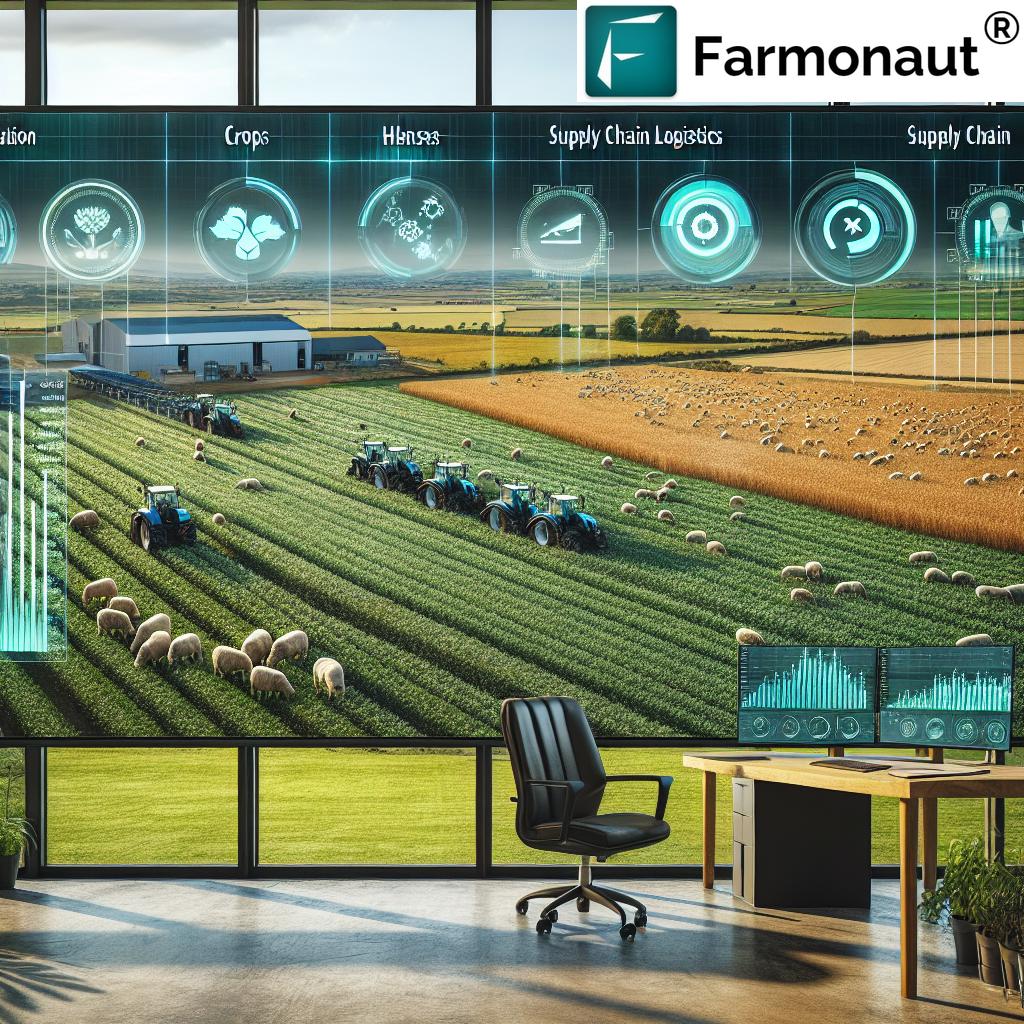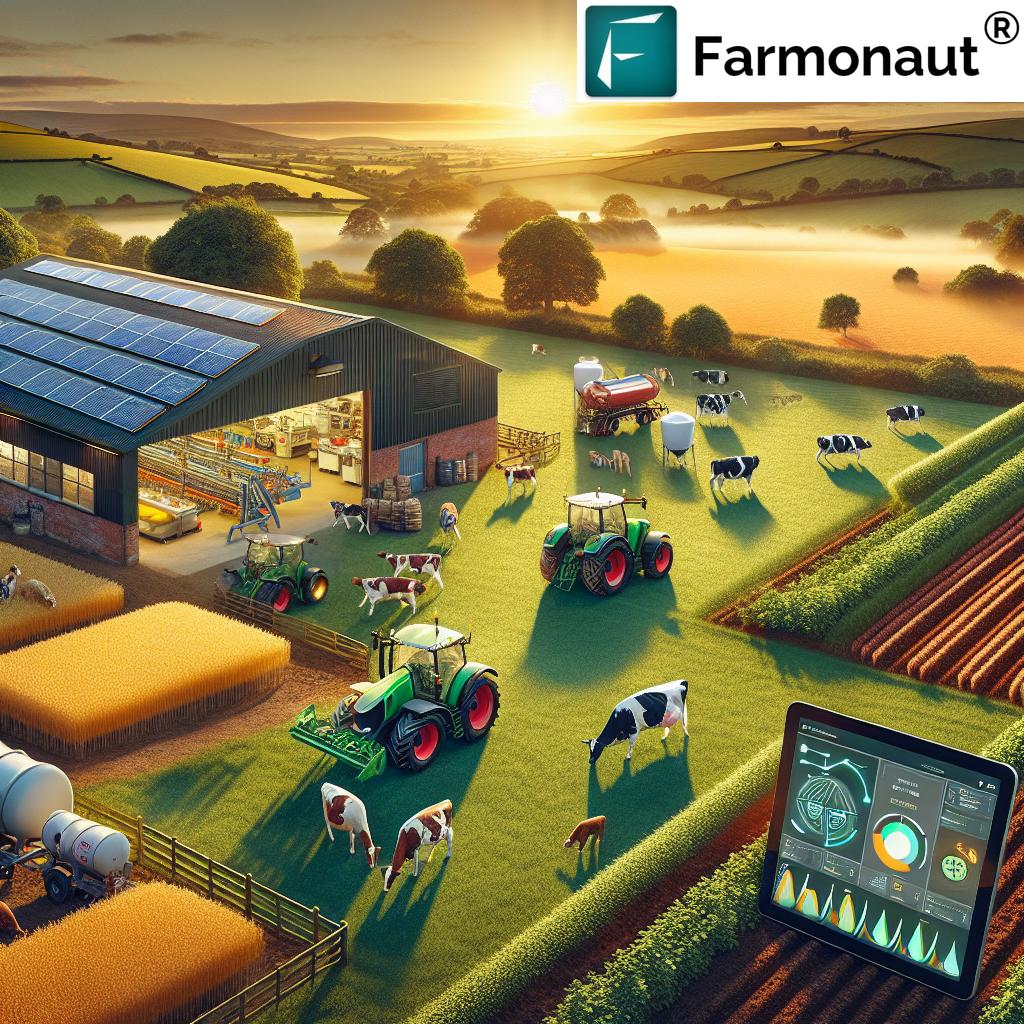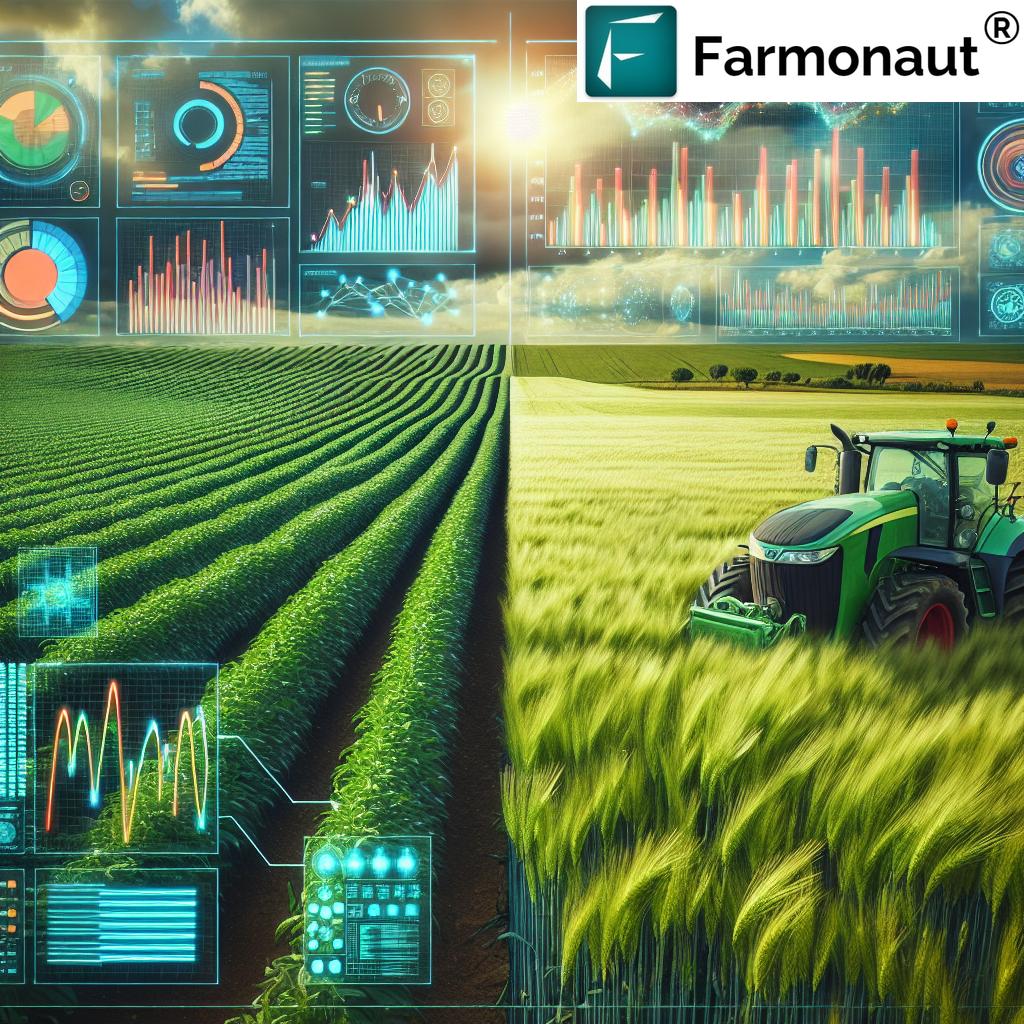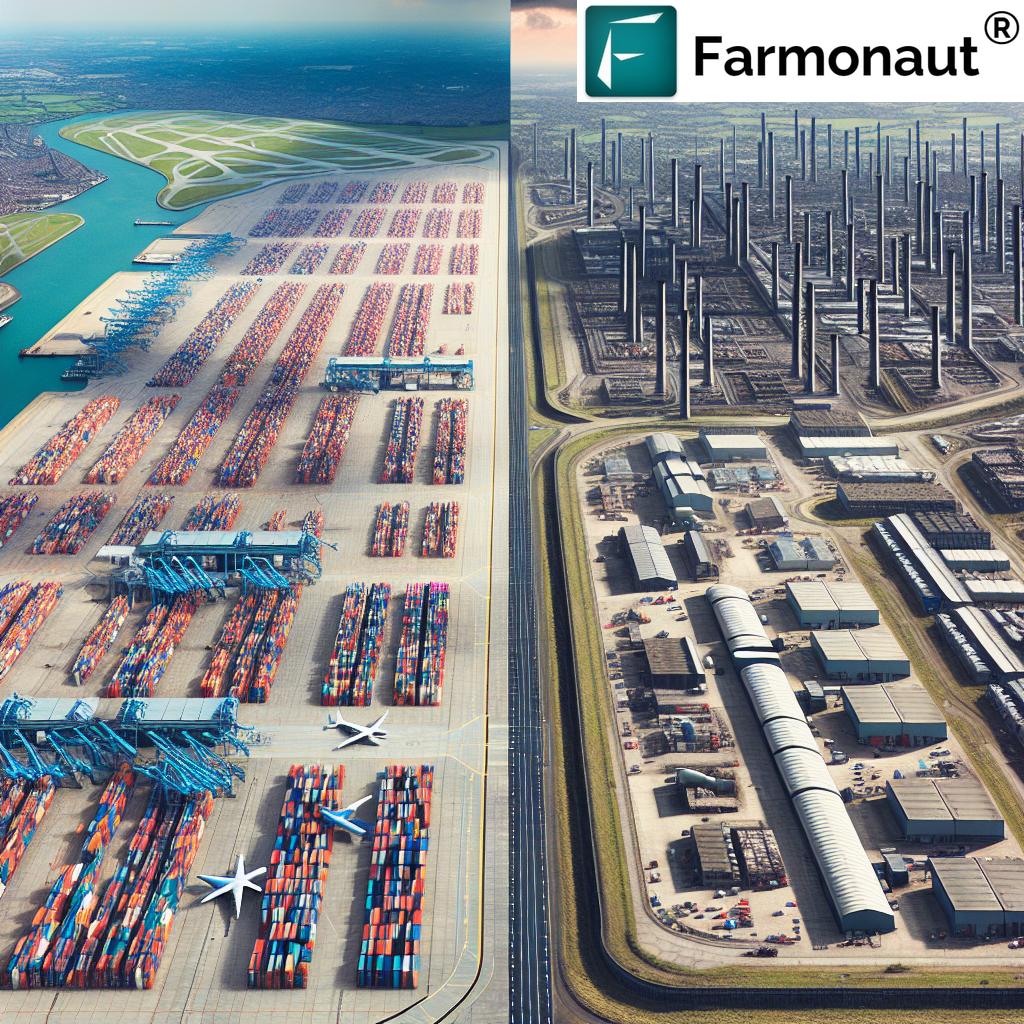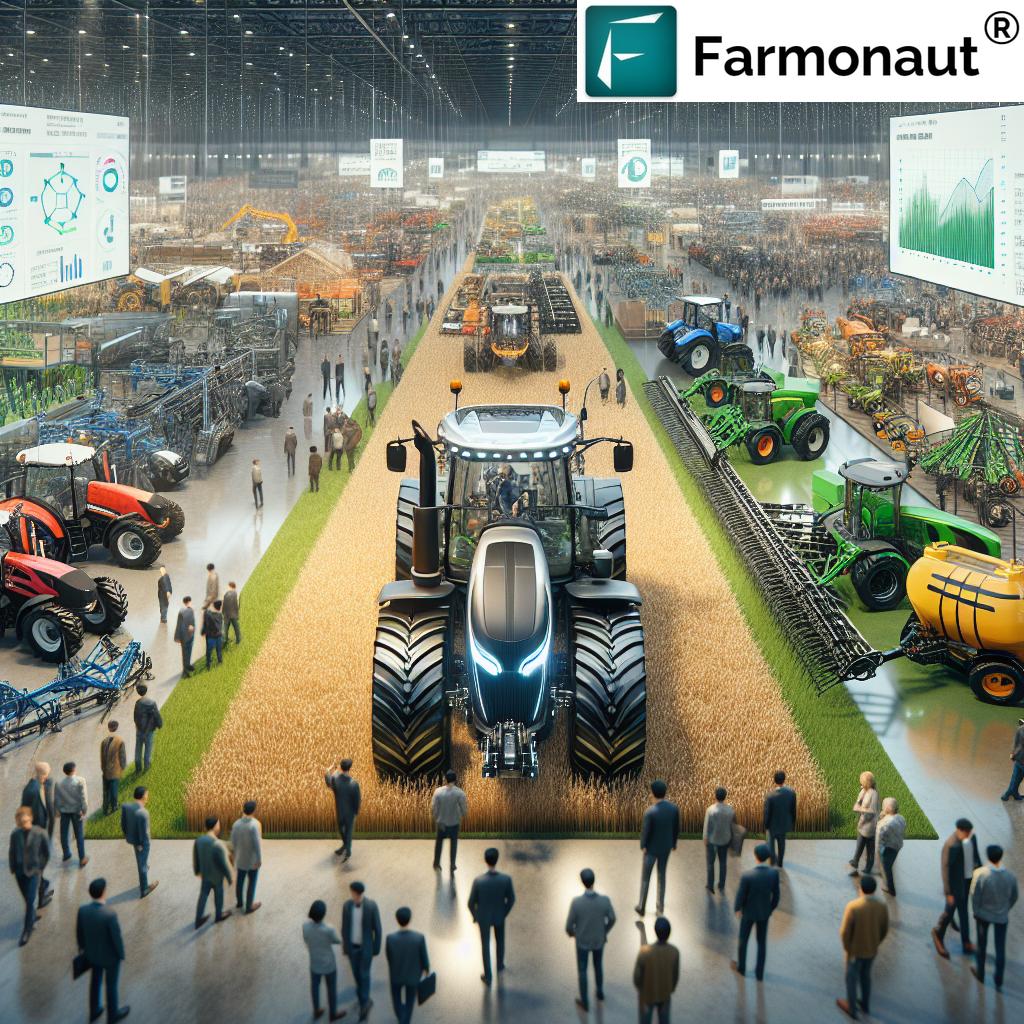Unlocking London’s Agricultural Future: How Farmonaut’s STEM-Powered Solutions Drive Innovation in Farming
“London’s agricultural future could see a 30% increase in crop yields through Farmonaut’s STEM-powered solutions.”
In the heart of one of the world’s most dynamic cities, a quiet revolution is taking place. London, known for its rich history and bustling financial district, is now at the forefront of agricultural innovation. As we navigate the complexities of feeding a growing global population while combating climate change, the intersection of agriculture and technology has never been more critical. At the center of this transformation is Farmonaut, a pioneering force in the realm of STEM-powered agricultural solutions.
We are witnessing a paradigm shift in how we approach farming in urban and peri-urban areas. The traditional image of agriculture as a low-tech industry is rapidly evolving, giving way to a new era of smart farming that leverages cutting-edge technology to maximize efficiency and sustainability. This blog post delves into how Farmonaut’s innovative technologies are reshaping London’s agricultural landscape, driving growth, and setting new standards for urban farming worldwide.
The Rise of STEM in Agriculture: A Global Workforce Transformation
The integration of Science, Technology, Engineering, and Mathematics (STEM) into agriculture represents a significant shift in the global workforce solutions landscape. As we explore Farmonaut’s role in this transformation, it’s crucial to understand the broader context of how STEM talent management is revolutionizing industries across the board.
In recent years, we’ve seen a surge in demand for STEM professionals in agriculture. This trend is part of a larger movement towards digital workforce transformation, where innovative recruitment strategies are essential for attracting top talent. The agricultural sector, once perceived as traditional and slow to change, is now at the forefront of adopting advanced technologies, creating a new breed of tech-savvy farmers and agricultural scientists.

Farmonaut stands at the intersection of this global workforce transformation and agricultural innovation. By harnessing the power of satellite technology, artificial intelligence, and data analytics, Farmonaut is not just improving farming practices; it’s creating an entirely new ecosystem of agricultural professionals.
Farmonaut’s Innovative Approach to London’s Agricultural Challenges
London, with its unique urban environment, presents specific challenges for agriculture. Limited space, soil quality issues, and the need for sustainable practices in a densely populated area all contribute to the complexity of urban farming. Farmonaut’s STEM-powered solutions are uniquely positioned to address these challenges head-on.
- Satellite-Based Crop Health Monitoring: Farmonaut’s advanced satellite imagery technology provides real-time insights into crop health across London’s urban and peri-urban farms. This allows farmers to make data-driven decisions about irrigation, fertilization, and pest control, optimizing resource use in space-constrained environments.
- AI-Driven Advisory Systems: The Jeevn AI system offers personalized recommendations tailored to London’s unique microclimate and urban farming conditions. This intelligent ecosystem of agricultural knowledge helps farmers navigate the complexities of growing crops in an urban setting.
- Blockchain-Based Traceability: In a city where consumers are increasingly conscious about the origin of their food, Farmonaut’s blockchain technology ensures transparency and traceability from farm to table. This not only builds trust but also supports local food systems and reduces carbon footprint.
These innovative solutions are not just theoretical concepts; they’re actively reshaping London’s agricultural landscape. By leveraging STEM talent and cutting-edge technology, Farmonaut is helping to create a more resilient and productive urban farming ecosystem.
The Impact of Farmonaut’s Solutions on London’s Agriculture
The implementation of Farmonaut’s STEM-powered solutions in London has led to remarkable improvements in agricultural productivity and sustainability. Let’s explore some of the key impacts:
- Increased Crop Yields: Through precise monitoring and AI-driven recommendations, London’s urban farms have seen significant increases in crop yields, some reporting up to 30% improvement.
- Resource Optimization: Water usage in London’s agriculture has been reduced by up to 25%, thanks to Farmonaut’s intelligent irrigation management systems.
- Reduced Environmental Impact: By enabling more efficient use of resources and promoting sustainable practices, Farmonaut is helping London’s farms reduce their carbon footprint.
- Enhanced Food Security: The ability to monitor and predict crop yields accurately has strengthened London’s local food supply chains, contributing to greater food security for the city.
These improvements demonstrate the transformative power of integrating STEM solutions into urban agriculture. Farmonaut’s technologies are not just enhancing existing practices; they’re fundamentally changing how we think about farming in urban environments.
STEM Talent Management in Agriculture: A New Frontier
The success of Farmonaut’s solutions in London highlights a growing need for STEM professionals in agriculture. This shift is creating new career opportunities and changing the face of the agricultural workforce. Let’s examine how this transformation is unfolding:
- Emerging Roles: New positions such as Agricultural Data Scientists, Precision Agriculture Specialists, and Agri-Tech Engineers are becoming increasingly common.
- Skill Set Evolution: Traditional agricultural knowledge is now being complemented by skills in data analysis, machine learning, and remote sensing technologies.
- Interdisciplinary Collaboration: The integration of STEM in agriculture is fostering collaboration between agronomists, software developers, and environmental scientists, creating a more diverse and innovative workforce.
This evolution in the agricultural workforce is not limited to London. It represents a global trend in STEM talent management, with implications for strategic workforce planning across the industry. As companies like Farmonaut continue to innovate, the demand for professionals who can bridge the gap between agriculture and technology will only grow.
“Farmonaut’s innovative farming technologies have the potential to reduce water usage in London agriculture by 25%.”
The Role of HR Technology in Agricultural Innovation
As the agricultural sector undergoes this technological revolution, the importance of HR technology integration cannot be overstated. The process of finding, recruiting, and retaining STEM talent for agriculture requires sophisticated HR solutions. Here’s how HR technology is supporting this transformation:
- AI-Powered Recruitment: Advanced algorithms are being used to match STEM professionals with agricultural roles, ensuring a better fit between candidates’ skills and job requirements.
- Virtual Reality Training: HR departments are leveraging VR technology to provide immersive training experiences for new agricultural technologies, accelerating the onboarding process.
- Data-Driven Talent Management: HR analytics tools are helping agricultural companies identify skill gaps and develop targeted training programs to keep their workforce at the cutting edge of agri-tech innovations.
These HR technology solutions are crucial in creating an intelligent talent ecosystem that can support the ongoing innovation in agriculture. By streamlining the process of acquiring and developing STEM talent, HR tech is playing a vital role in the digital workforce transformation of the agricultural sector.
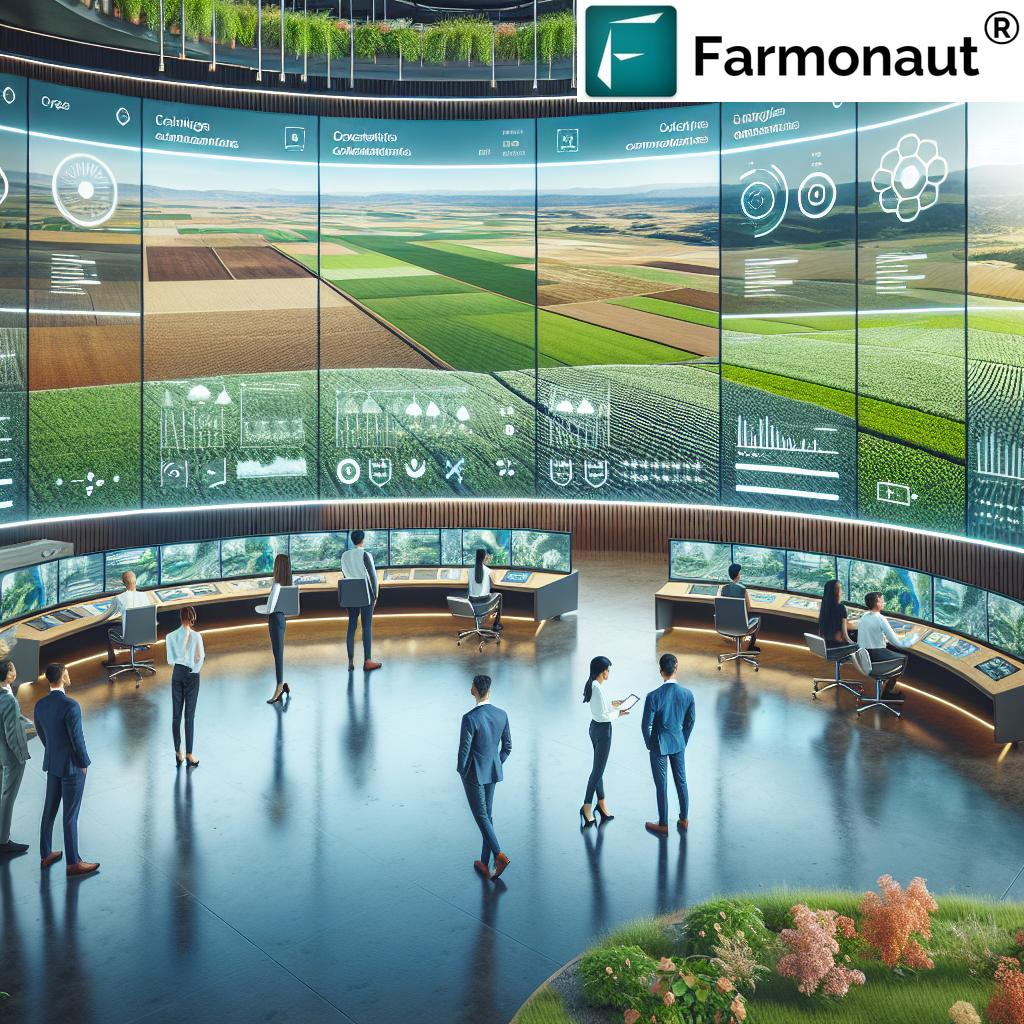
Farmonaut’s Vision for the Future of London’s Agriculture
As we look to the future, Farmonaut’s vision for London’s agriculture is both ambitious and inspiring. The company is committed to pushing the boundaries of what’s possible in urban farming, with several key initiatives on the horizon:
- Expanding Vertical Farming Solutions: Farmonaut is developing new technologies to support vertical farming in London, maximizing space utilization and bringing fresh produce even closer to consumers.
- Integrating IoT in Urban Agriculture: The Internet of Things (IoT) is set to play a larger role in Farmonaut’s solutions, with plans to deploy smart sensors across London’s farms for even more precise monitoring and control.
- Advancing AI Capabilities: Continuous improvements to the Jeevn AI system will provide even more accurate and personalized recommendations, taking into account London’s unique urban agricultural challenges.
- Fostering Agricultural Education: Farmonaut is partnering with educational institutions to develop programs that will train the next generation of tech-savvy urban farmers.
These initiatives demonstrate Farmonaut’s commitment to not just adapting to the future of agriculture, but actively shaping it. By continuing to invest in STEM-powered solutions, Farmonaut is ensuring that London remains at the forefront of agricultural innovation.
The Global Impact of London’s Agricultural Transformation
While our focus has been on London, the implications of this agricultural revolution extend far beyond the city’s borders. The success of Farmonaut’s STEM-powered solutions in London serves as a model for other urban centers around the world. Here’s how London’s experience is influencing global agricultural practices:
- Knowledge Transfer: The lessons learned from implementing advanced agricultural technologies in London are being shared with cities facing similar challenges worldwide.
- Setting New Standards: London’s adoption of STEM-powered agriculture is setting new global standards for urban farming practices and sustainability.
- Inspiring Innovation: The success of Farmonaut in London is inspiring other agri-tech companies to develop similar solutions tailored to different urban environments.
- Global Workforce Impact: The demand for STEM professionals in agriculture, as demonstrated in London, is influencing global workforce solutions and talent management strategies.
This global impact underscores the importance of innovative recruitment strategies and strategic workforce planning in the agricultural sector. As cities worldwide look to London as a blueprint for urban agricultural innovation, the demand for STEM talent in agriculture is set to grow exponentially.
Comparing Traditional Farming Methods with Farmonaut’s STEM Solutions
To fully appreciate the transformative impact of Farmonaut’s technologies on London’s agriculture, it’s helpful to compare traditional farming methods with these innovative STEM-powered solutions. The following table highlights key differences:
| Aspect | Traditional Farming Methods | Farmonaut’s STEM Solutions |
|---|---|---|
| Crop Monitoring | Manual field inspections, often time-consuming and subjective | Satellite-based remote sensing providing real-time, objective data |
| Resource Management | Based on experience and general guidelines, often leading to overuse | AI-driven precise recommendations for optimal resource utilization |
| Yield Prediction | Reliant on historical data and farmer’s judgment | Advanced analytics combining multiple data sources for accurate forecasting |
| Pest Control | Reactive approach, often leading to overuse of pesticides | Early detection systems allowing for targeted, minimal intervention |
| Sustainability Impact | Often unquantified, with limited ability to track improvements | Detailed carbon footprint tracking and actionable sustainability metrics |
This comparison clearly illustrates the advantages of Farmonaut’s STEM-powered solutions in addressing the unique challenges of urban agriculture in London. By leveraging advanced technologies, Farmonaut is enabling a more efficient, sustainable, and productive agricultural sector.
The Role of Managed Services in Agricultural Innovation
As we delve deeper into the integration of STEM solutions in agriculture, it’s important to highlight the role of managed services in facilitating this transformation. Managed services for STEM industries, particularly in the context of agriculture, are playing a crucial role in enabling companies like Farmonaut to focus on innovation while ensuring smooth operations.
Here’s how managed services are supporting the agricultural revolution in London:
- Technology Infrastructure Management: Managed service providers are ensuring that the complex technological infrastructure required for Farmonaut’s solutions is maintained and optimized.
- Data Security and Compliance: With the increasing amount of sensitive agricultural data being collected and analyzed, managed services are crucial in ensuring data security and regulatory compliance.
- Scalability and Flexibility: As Farmonaut’s solutions continue to evolve and expand, managed services provide the scalability and flexibility needed to adapt to changing requirements.
- 24/7 Support: The critical nature of agricultural operations requires round-the-clock support, which managed services efficiently provide.
By leveraging managed services, Farmonaut and other agri-tech companies can focus on their core competencies – developing innovative STEM solutions for agriculture – while ensuring that their technological backbone remains robust and reliable.
The Future of Work in Agriculture: A STEM-Powered Landscape
As we look towards the future, it’s clear that the agricultural sector is undergoing a profound transformation, driven by STEM innovations. This shift is not just changing how we farm; it’s redefining the very nature of work in agriculture. Here’s what the future of work in agriculture might look like:
- Hybrid Skill Sets: Future agricultural professionals will need to combine traditional farming knowledge with expertise in data analysis, robotics, and AI.
- Remote Farming: With technologies like those offered by Farmonaut, many agricultural tasks can be monitored and managed remotely, changing the physical nature of farm work.
- Continuous Learning: The rapid pace of technological advancement in agriculture will necessitate a culture of continuous learning and upskilling.
- Collaborative Ecosystems: The future of agricultural work will likely involve more collaboration between farmers, technologists, and data scientists, creating diverse and dynamic work environments.
This evolving landscape presents both challenges and opportunities for workforce solutions providers. The need for innovative recruitment strategies and strategic workforce planning in agriculture has never been greater.
Farmonaut’s Contribution to Sustainable Urban Development
Beyond its direct impact on agriculture, Farmonaut’s STEM-powered solutions are contributing significantly to London’s broader goals of sustainable urban development. Here’s how:
- Reducing Food Miles: By enabling efficient urban farming, Farmonaut is helping to reduce the distance food travels, lowering carbon emissions associated with transportation.
- Enhancing Urban Biodiversity: Smart farming practices supported by Farmonaut’s technologies are creating green spaces that contribute to urban biodiversity.
- Water Conservation: Precision irrigation systems are helping to conserve water, a critical resource in urban environments.
- Education and Community Engagement: Farmonaut’s technologies are being used in educational programs, fostering a greater understanding of sustainable agriculture among London’s residents.
These contributions highlight how STEM innovations in agriculture can have far-reaching impacts on urban sustainability and quality of life.
Conclusion: Embracing a STEM-Powered Agricultural Future
As we’ve explored throughout this post, Farmonaut’s STEM-powered solutions are at the forefront of a revolutionary transformation in London’s agricultural landscape. By leveraging advanced technologies such as satellite imagery, AI, and blockchain, Farmonaut is not just improving farming practices; it’s reshaping the entire agricultural ecosystem.
The impact of this transformation extends far beyond increased crop yields and resource efficiency. It’s creating new career opportunities, driving innovation in workforce solutions, and contributing to London’s sustainability goals. As we look to the future, it’s clear that the integration of STEM in agriculture will continue to play a crucial role in addressing global challenges such as food security and climate change.
For London, and indeed for urban centers worldwide, the path forward is clear. Embracing STEM-powered agricultural solutions is not just an option; it’s a necessity for creating resilient, sustainable, and productive urban food systems. As Farmonaut continues to innovate and expand its offerings, we can look forward to a future where technology and nature work in harmony to feed our cities and protect our planet.
The agricultural revolution happening in London serves as a beacon of innovation for the world. It demonstrates the power of combining traditional agricultural knowledge with cutting-edge STEM solutions. As we move forward, the lessons learned and technologies developed here will undoubtedly shape the future of farming globally, ensuring a more sustainable and food-secure future for all.
FAQ Section
Q: What is Farmonaut and how does it contribute to London’s agriculture?
A: Farmonaut is a pioneering agricultural technology company that offers advanced, satellite-based farm management solutions. It contributes to London’s agriculture by providing real-time crop health monitoring, AI-based advisory systems, and resource management tools, helping urban farmers optimize their yields and reduce resource waste.
Q: How does Farmonaut’s technology differ from traditional farming methods?
A: Farmonaut’s technology leverages satellite imagery, AI, and data analytics to provide precise, real-time insights into crop health and farm conditions. This differs significantly from traditional methods that rely on manual inspections and historical data, offering more accurate and timely information for decision-making.
Q: Can Farmonaut’s solutions be applied to small urban farms in London?
A: Yes, Farmonaut’s solutions are scalable and can be applied to farms of various sizes, including small urban farms in London. The technology is designed to be accessible and affordable, making precision agriculture available to a wide range of farmers.
Q: How does Farmonaut contribute to sustainability in urban farming?
A: Farmonaut contributes to sustainability by optimizing resource use, reducing water waste, minimizing the need for pesticides through early detection of issues, and providing tools for carbon footprint tracking. This helps urban farms in London operate more efficiently and with less environmental impact.
Q: What kind of skills are needed to work with Farmonaut’s technologies?
A: Working with Farmonaut’s technologies typically requires a blend of agricultural knowledge and STEM skills. Proficiency in data analysis, understanding of remote sensing technologies, and familiarity with AI and machine learning concepts are valuable. However, Farmonaut also provides user-friendly interfaces that make their tools accessible to farmers with varying levels of technical expertise.
Earn With Farmonaut: Affiliate Program
Earn 20% recurring commission with Farmonaut’s affiliate program by sharing your promo code and helping farmers save 10%. Onboard 10 Elite farmers monthly to earn a minimum of $148,000 annually—start now and grow your income!
Explore Farmonaut’s innovative solutions:
API Developer Docs: Farmonaut API Documentation





